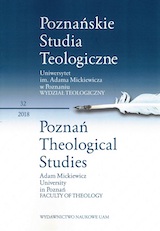„Maria Magdalena powiedziała do niego po hebrajsku: «rabbuni»” (J 20,16). „Rabbuni” i inne aramejskie określenia odnoszące się do Boga/Chrystusa w greckim tekście Nowego Testamentu
“Mary of Magdala said to him in Hebrew, «Rabbouni»” (John 20:16). “Rabbouni” and other Aramaic words referring to the God/Christ in the Greek New Testament
Author(s): Piotr OstańskiSubject(s): Historical Linguistics, Evaluation research, Biblical studies, Philology
Published by: Uniwersytet Adama Mickiewicza
Keywords: Aramaic; the Greek New Testament; Messiah; Teacher; Father;
Summary/Abstract: Everyone who studies the New Testament Bible must take into account its Aramaic background that results from several factors: – the Aramaic language was very popular in Roman Palestine during the first century A.D.; – the Aramaic was Jesus’ mother tongue; – Jesus’ teaching was being recorded in Aramaic and then it circulated among the people; – the oldest Church consisted of Aramaic speaking communities.
Journal: Poznańskie Studia Teologiczne
- Issue Year: 32/2018
- Issue No: 1
- Page Range: 63-75
- Page Count: 13
- Language: Polish

